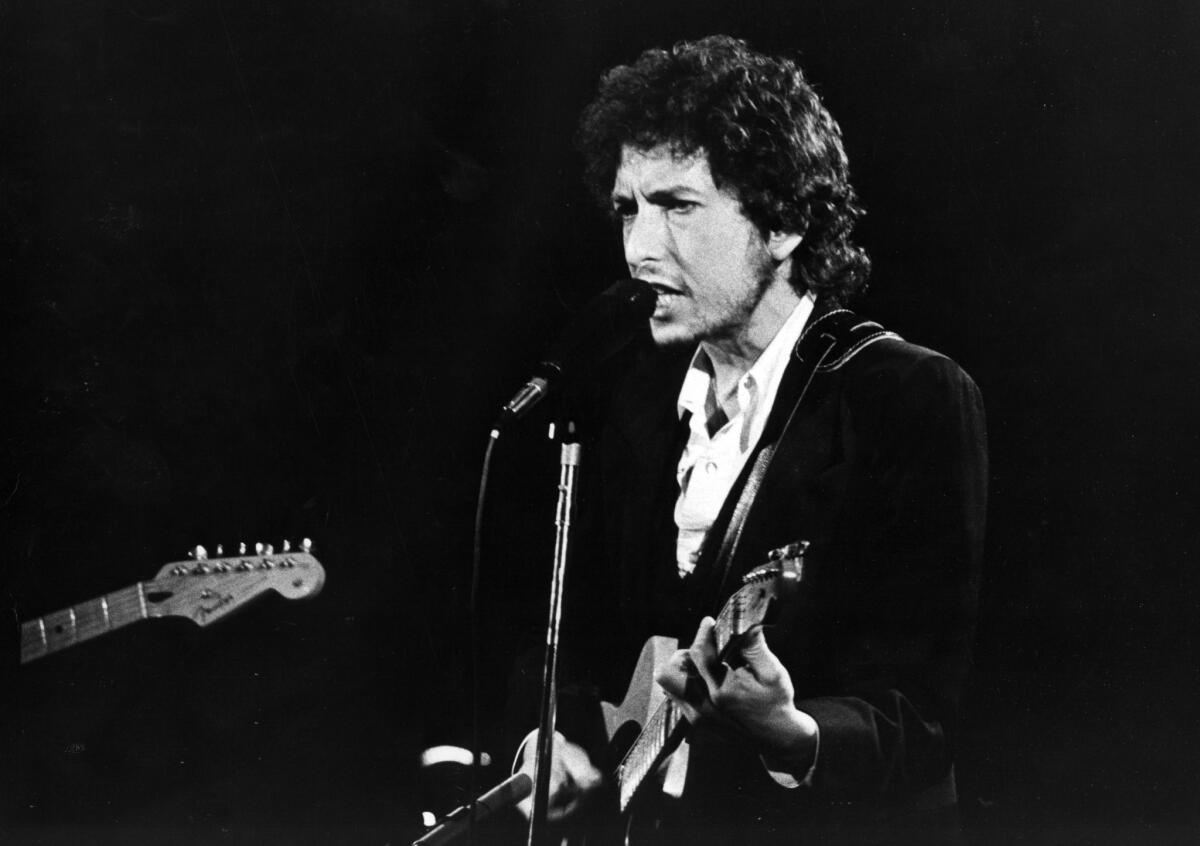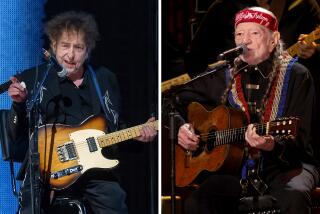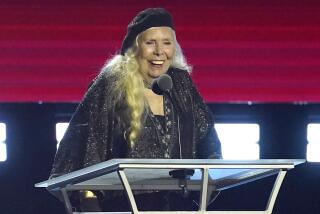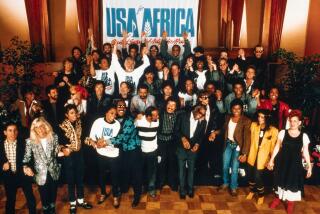Review: Bob Dylan opens three nights in Hollywood with grunts, grim themes

Bob Dylan wore a gray suit and wide-brimmed hat, the latter of which shadowed eyes he described in song as holding “secrets in them that I can’t disguise.” He stood before a well-behaved and polite, if mostly nonplussed, crowd at the Dolby Theatre in Hollywood and let out a series of nasally, nearly indistinguishable grunts.
“[mumble mumble] Why thank you [mumble mumble mumble] right back,” he may have said.
They would be the most notable nonmusical utterances that the singer, songwriter and perennial badass would direct at the crowd Friday night. He’d just sung in “Love Sick” of being worn out, and he kind of seemed it. “I’m sick of love -- I wish I’d never met you,” he offered. “I’m sick of love -- I’m trying to forget you.” After the song ended and he spoke his sentence, Dylan and his five-piece band walked off and the intermission lights came up. The blues indeed.
Dylan, 73, was midway through his debut performance at the Dolby Theatre, longtime home of the Academy Awards. The first of three consecutive gigs in Los Angeles as part of his Never Ending Tour, the artist was playing, by his own website’s count, for the 54th time in L.A., the most recent of a run stretching back to the Hollywood Bowl in 1965.
Was it a drag? Thematically, yes. How can a song like 2009’s “Forgetful Heart,” with the couplet, “The door has closed forevermore / If indeed there ever was a door,” be anything but? It’s one thing to negate the future, after all, but it’s downright hostile to do the same to the past. The rendition, though, was tempered by an ethereal delicacy, highlighted by multi-instrumentalist Donnie Herron’s accents on banjo and lead guitarist Charlie Sexton’s typically gentle, evocative lines.
As has been the case for, well, ever, Dylan didn’t play songs as recorded. He and his band (featuring Stu Kimball, rhythm guitar; Tony Garnier, bass guitar; and George Receli, drums, percussion) delivered a dose of Charlie Christian/Django Reinhardt jazz here, some Bob Wills and his Texas Playboys-style twang there.
More Lone Star swing than New York folk, his sound was electric but minus much distortion or aural antagonism. When Dylan sang high, he hit where he was aiming. When he sang low, which he did a lot, it was like he was burping out the lines. At one point during “Long and Wasted Years,” I imagined his vocal cords as a frayed rope holding a broke-down engine. One day soon it may bust, but until then the threat is something to behold.
Was the set illuminating? When he delivered a typically oblique take on “She Belongs to Me” and the line, “She wears an Egyptian ring that sparkles before she speaks” it was. And pretty much whenever Dylan played harmonica or Sexton soloed. Did Our Hero seem a spectral grump, somewhere between myth-buster and misanthrope? He did to me -- but who can really tell?
The couple sitting next to us left four songs in, right after Dylan had chugged through “Beyond Here Lies Nothin’.” (What did they expect?) As the band rolled into “Spirit in the Water,” a few pockets of the crowd clapped tentatively, only half-sure whether this was variation on a classic or one of his recent grim weepers.
“Things have changed,” Dylan had warned them in his first song. “People are crazy and times are strange / I’m locked in tight, I’m out of range / I used to care, but things have changed.”
Yes, they have. Where his voice used to soar he’s now ditch-digging while around him remarkable musicians swirl and twang. At this point it should be understood that their versions of “Blowin’ in the Wind” or “All Along the Watchtower,” both of which Dylan offered in a quickie two-song encore, swung in ways utterly removed from the perhaps platonic ideal versions locked in our stubborn memories.
The evening featured a nearly identical set as he’s played of late, one heavy on his 21st century work, nothing from the 1980s and light on his formative ‘60s and ‘70s classics. Recent-vintage Dylan doesn’t play the guitar. He alternately sang, sat behind a piano -- guy’s got some great barrelhouse chops -- blew typically mesmerizing harmonica runs, coughed-forth couplets and occasionally did a quirky little groove dance that signified approval or joy or something.
Dylan sang about long, wasted years, about how “the sun can burn your brains right out.” During the wonderfully grim “Soon After Midnight,” from his most recent (and excellent) studio album “Tempest,” he described the action in the wee hours, of drunken revelry and bitterness: “Two-timin’ Slim? Who’s ever heard of him? I’ll drag his corpse through the mud.”
Was there contempt within these grunts? Was that a hint of a wry smile that curled across his face at one point? Who knows. But Dylan doesn’t do warm and comfortable, and certainly has no time to parse himself.
Which is to say, “Long and Wasted Years” could be about a lover or it could be directed at us. “It’s been such a long long time / Since we loved each other when our hearts were true / One time, for one brief day, I was the man for you.”
It seemed longer than that, but memories are sometimes hard to trust.
Follow Randall Roberts on Twitter @liledit
More to Read
The biggest entertainment stories
Get our big stories about Hollywood, film, television, music, arts, culture and more right in your inbox as soon as they publish.
You may occasionally receive promotional content from the Los Angeles Times.







